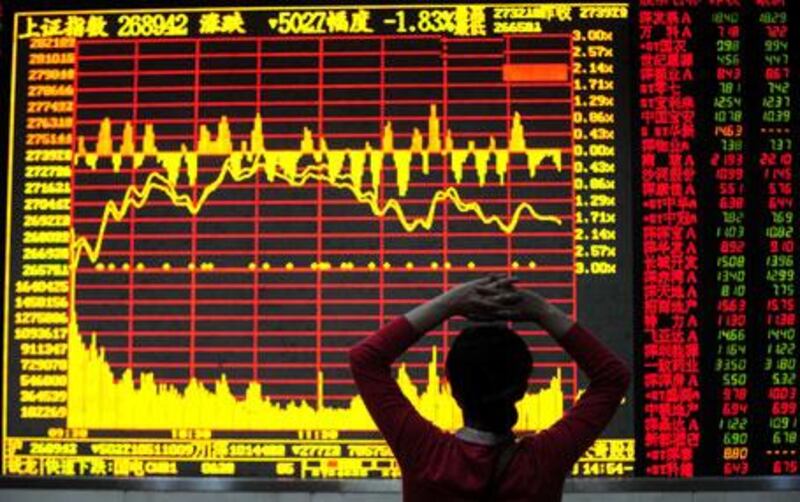BRUSSELS // With shares plummeting from China to the United States on fears that Greece's debt disaster could undermine a global recovery, European leaders gather today to try and calm panicky markets sceptical of their pronouncements that the crisis won't spread to other countries. A summit of the 16 leaders from countries using the euro - initially called to sign off on a €110 billion (Dh510bn) bailout package for Greece and draw lessons for the future - faces the challenge of urgent crisis management, after the euro dropped to its lowest level in 14 months and bond markets dumped Greek debt.
EU leaders have insisted for days that the Greek financial implosion was a unique combination of bad management, free spending and statistical cheating that doesn't apply to any other eurozone nation, such as troubled Spain or Portugal. They said the bailout should contain the problem by giving Greece three years of support and preventing a default when it has to pay €8.5 billion in bonds coming due May 19.
Yet, the markets have taken little heed. Stocks, Greek bonds and the euro plunged even after the head of the European Central Bank, Jean-Claude Trichet, underlined that "Portugal is not Greece. Spain is not Greece" on Thursday. Along with the eurozone meeting, the G7 finance ministers will hold a teleconference Friday on the crisis, according to Japan's finance minister. After struggling to get ahead of the crisis for weeks, governments are now underlining their determination to act by speeding approval of their contributions to the emergency loan package for Athens, hoping to contain the threat to their currency to just one country. Germany, where bailing Greece out is not popular, was set to vote today, while Italy approved its contribution earlier.
"This is about defending the common European currency as a whole, and with it we are defending the European project," said the finance minister Wolfgang Schaeuble as the German lawmakers were set to vote on their €22.4 billion slice of the package. "We have to make this decision and we have no better alternative," Mr Schaeuble told the lower house of parliament. Earlier today, France's parliament adopted a budget amendment to release French funds for Greece's bailout. Together the two nations account for almost half the €80 billion the eurozone nations have to come up with. The rest of the money will come from the International Monetary Fund.
Greek lawmakers approved drastic austerity cuts Thursday worth about €30 billion through 2012 - that will slash pensions and civil servants' pay and further hike consumer taxes. The measures were a prerequisite needed to secure international rescue loans. Today, Greek borrowing costs hit another record high and shares on the Athens stock exchange were lower amid losses in European markets and fears that Greece will have difficulty implementing its austerity plan.
In New York, the Dow Jones industrials plunged 1,000 points in less than half an hour on fears that Greece's debt problems could halt the global economic recovery. The Dow managed to recover two-thirds of its losses and close down 347 at 10,520. Fears of Greek default have undermined the euro, and while the current package should keep Greece from immediate bankruptcy, its long-term prospects are unclear. The country's growth prospects are weak, and the population's willingness to accept cutbacks may wane, leading some economists to predict an eventual debt restructuring somewhere down the road.
*AP






